Humanities & Social Sciences
School of Social Sciences Honors Three Retired Staff
Published
1 year agoon
By
Jane Anyango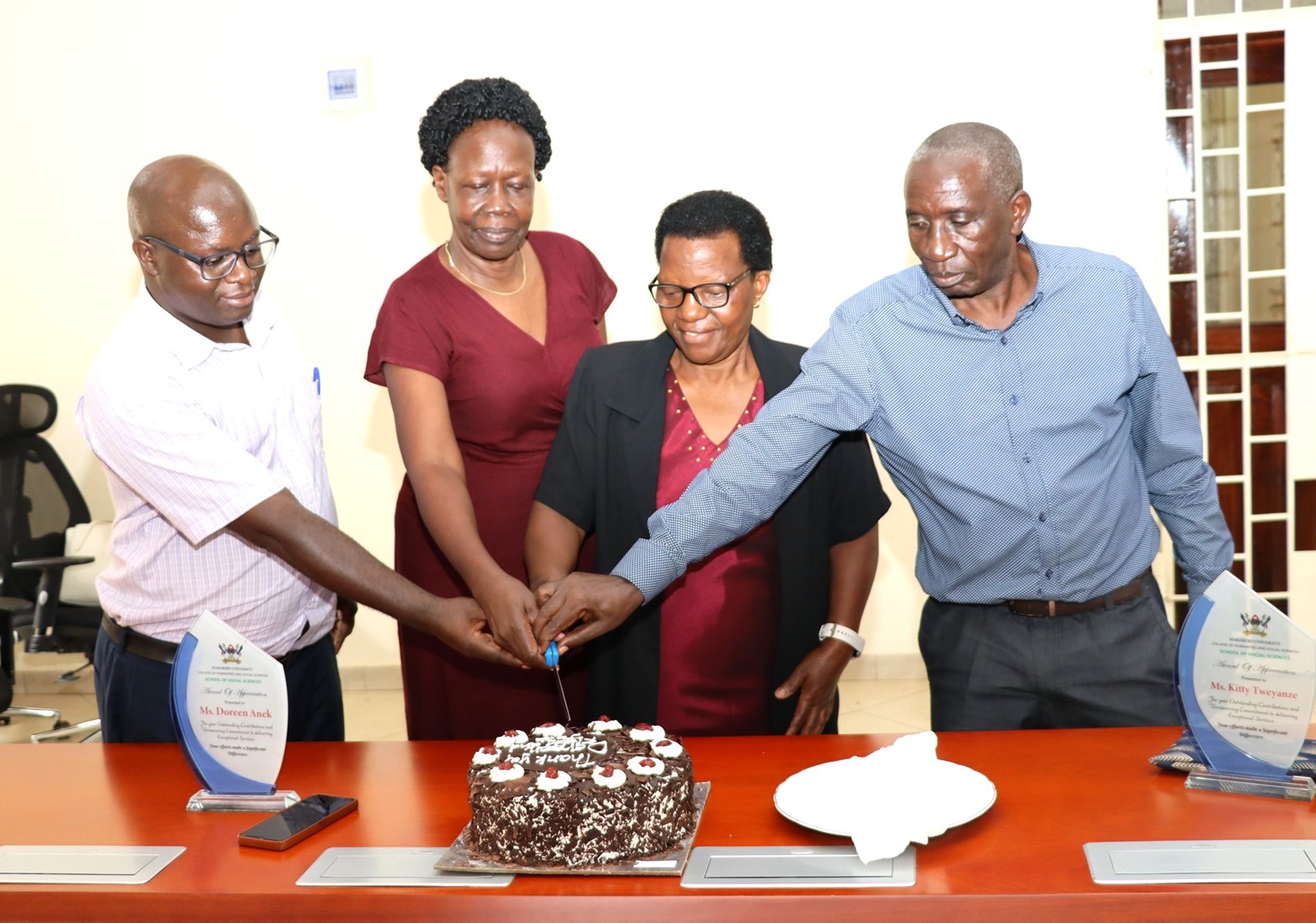
On September 2, 2024, the School of Social Sciences at Makerere University held a farewell ceremony to honor three retired staff members for their exemplary service. The retirees -Ms. Doreen Anek, the Senior Assistant Registrar; Ms. Kitty Tweyanze, Senior Administrative Secretary; and Mr. Jackson Byamugisha, a security guard—were recognized for their outstanding contributions and unwavering commitment to the university. Each was presented with a plaque as a symbol of appreciation for their years of dedicated service.
The farewell party and handover ceremony took place in the school’s smartroom and was attended by heads of departments, academic and administrative staff, student representatives, and relatives of the retirees. Presiding over the event, Dr. Justus Twesigye, Dean of the School of Social Sciences, emphasized the significance of the ceremony in recognizing the invaluable roles these individuals played.
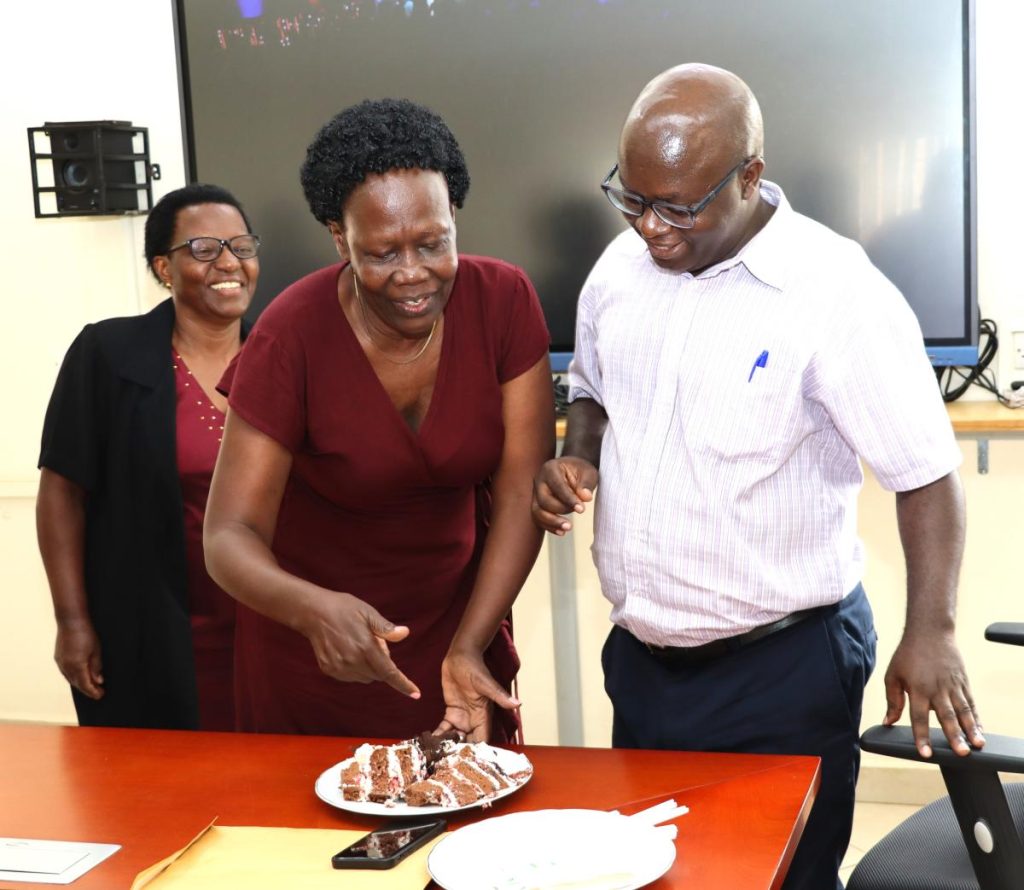
“Today, we are saying thank you to our distinguished, experienced, long-serving colleagues who have diligently served us. They have touched the lives of many in the school and the university at large. It is important that we stand with them and say, ‘Thank you so much,’” Dr. Twesigye remarked.
Reflecting on a Legacy of Support
Ms. Doreen Anek joined Makerere University in 2000 as a Senior Assistant Registrar, where she managed critical administrative functions, including the organization of university graduations. Ms. Kitty Tweyanze began her career at Makerere in 1978 in the School of Education and later transferred to the School of Social Sciences in 1998. She was praised for her integrity and meticulous work in academic administration. Mr. Jackson Byamugisha, who joined the university in 2001, was recognized not only for his role in security but also for stepping up in various capacities to support the school.
Dr. Twesigye, reflecting on his own journey as Dean, shared his initial apprehensions when he took office two years ago. He recalled, “I was scared and had sleepless nights about how I would organize examinations, manage the school board, and handle cases of malpractice. But the trio reassured me that I would manage, and their reassurance became true.”
The Dean spoke highly of Mr. Byamugisha’s dedication, saying, “Jackson loved his job. He would come, sit around, and ensure that he did his work diligently. We have sometimes called him during unordinary hours on Saturdays and beyond late hours. Jackson served as a custodian when we didn’t have one; he just stepped in and did two jobs. So, he is leaving as a very happy person.”
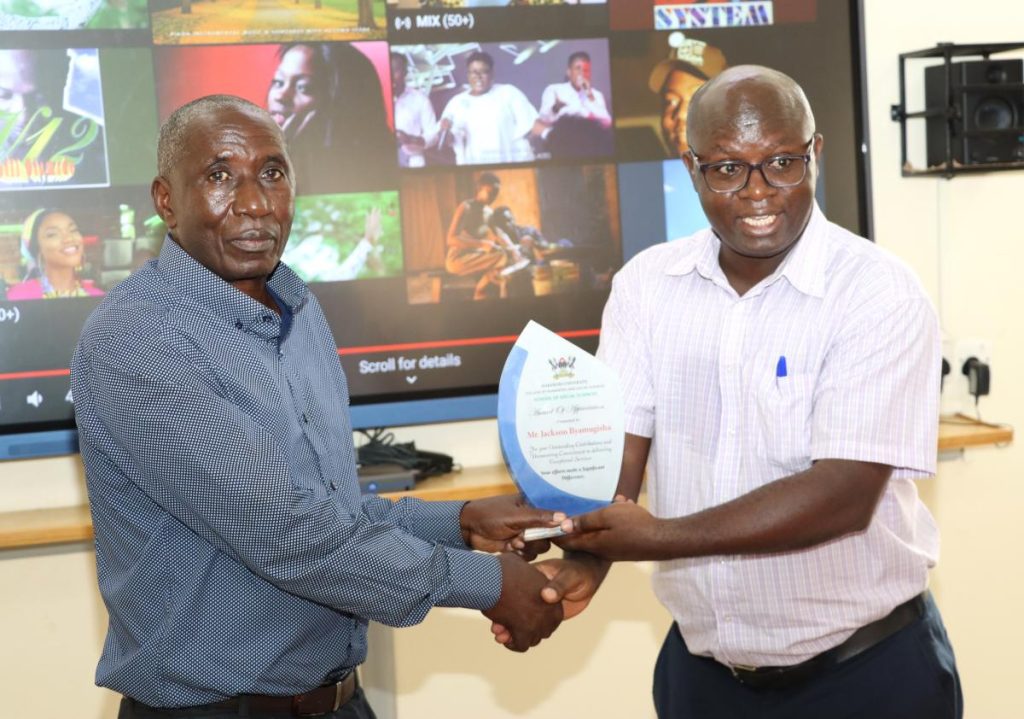
Dr. Twesigye expressed his admiration for the trio, describing them as irreplaceable servants whom he would have wished to retain if circumstances allowed. “But we can only know that they are not retiring from work; they are retiring to something. They have special callings, some of which they will discover soon. I can tell that they will remain useful and productive,” he said.
He encouraged the retirees to cherish the friendships and memories they created during their time at the university. “These memories and friends should be things that they reflect on whenever they feel they are on their own,” Dr. Twesigye advised.
In his closing remarks, Dr. Twesigye challenged current students and staff to maintain connections with the retired staff. “We should maintain such a culture. These are part of our families forever. We are not going to let it go,” he asserted.
The Dean also congratulated the retirees for leaving with clean records, highlighting the challenges and risks of public service. “Very few people go out of public service with their heads held high. Some people exit public service through backdoors. So, we should celebrate these two ladies and this gentleman for having been here for all this time and leaving without any blemish. It is a huge achievement. Your records are intact. You can always come back anytime, and you don’t have to feel ashamed.”
The Biggest Task Was Handling Graduation, Says Anek
Retired Senior Assistant Registrar Doreen Anek expressed her gratitude to all who attended the celebration marking her retirement, describing it as a day of joy and fulfillment. Reflecting on her career at Makerere University, Anek shared insights into the challenges and accomplishments she experienced, particularly emphasizing the demanding task of managing university graduations.
Anek acknowledged that September 2nd was a special day for her, one that symbolized the end of a significant chapter in her life. She humorously noted that she had always been mentally prepared for celebrations, especially since her young daughter shares her love for festive occasions. “Today is a day of celebration,” Anek said, “and I am grateful to end this tour on a good note.”
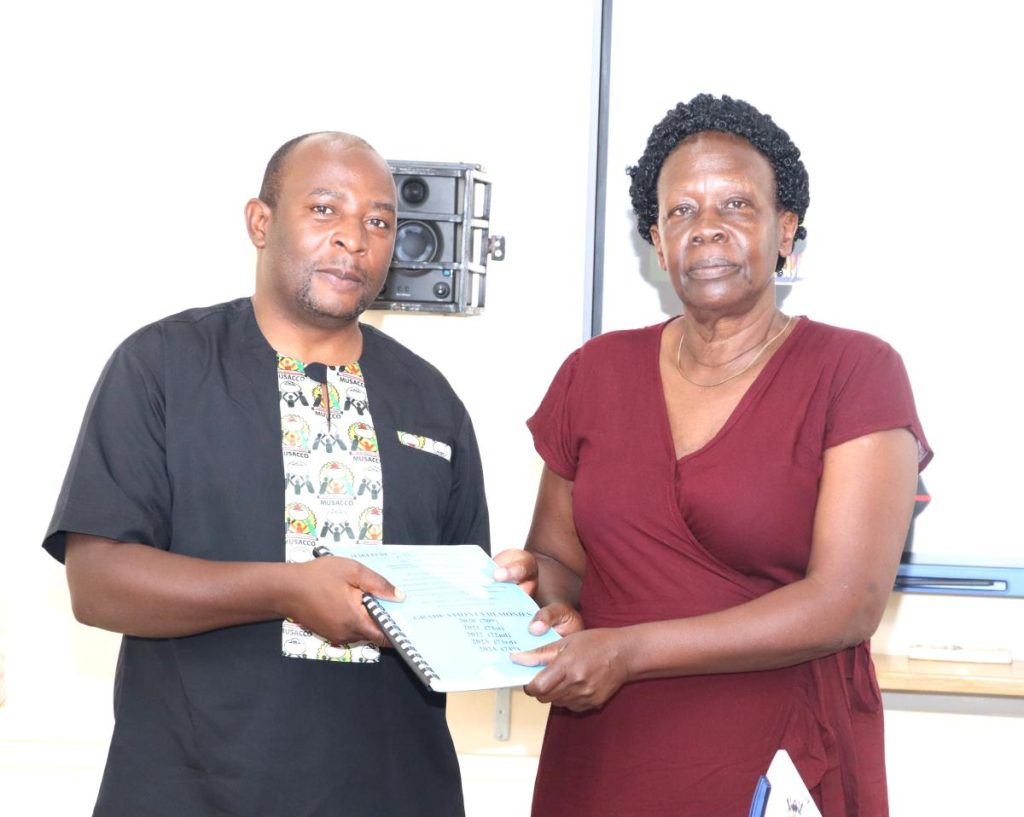
Anek highlighted the immense responsibility of organizing graduations as one of the most challenging aspects of her role. She described the process as demanding, involving coordination with various departments and faculty members. “What we have been doing is not an easy task, but by God’s grace, we have always been able to accomplish it,” Anek reflected.
She emphasized the collaborative nature of the work, acknowledging the vital role played by heads of departments and other staff members. “The biggest task we have been handling is graduation—having to chase around staff, heads of departments—but at the end of it, we always come together and say, ‘We have done it.’ It has not been a personal contribution; it is a collective responsibility,” Anek remarked. She expressed her appreciation to the heads of departments, noting, “There is not a single day you would go to their offices and request something, and they don’t act. They would run around to ensure everybody plays their part.”
Anek also took a moment to thank the lecturers, acknowledging that while there were occasional clashes, the focus was always on fulfilling the school’s requirements. “So where I have wronged you, especially on the issues of results, please forgive me,” she said. “But I know it was a responsibility that you had to undertake, and sometimes I harassed you a little, but I am glad you responded.”
During her speech, Anek gave special recognition to her colleague, Ms. Kitty Tweyanze, whom she referred to as her boss and mentor. She recounted how, when she joined the School of Social Sciences in 2011, Ms. Tweyanze was working in the Dean’s office, handling marks on a locally programmed system. “Kitty taught me how that system works,” Anek shared. Their professional relationship quickly evolved into a strong friendship, particularly after Ms. Tweyanze moved to the Faculty office. “We became great friends,” Anek added, reflecting on the close bond they formed over the years.
Anek concluded her remarks by thanking all her colleagues for their support and collaboration, which she credited for the school’s continued success. Her words underscored the importance of teamwork and mutual respect in achieving shared goals, leaving a lasting impression on all who attended the ceremony.
“I Have Not Conflicted Nor Harmed Anybody,” Says Kitty Tweyanze
Ms. Kitty Tweyanze, one of the three retired staff members honored, reflected on her decades-long career during the retirement ceremony.
Having initially joined the university at the Faculty of Education, Kitty shared that she worked there for five years before leaving to pursue other opportunities. However, she was always welcomed back by the university, and in 1999, she returned to serve in the School of Social Sciences. “I was given an opportunity to come back and was posted in Social Sciences,” she recounted. “At that time, the Bachelor of Arts was a large program, with around 100,000 students in the day and 600 in Social Work.”
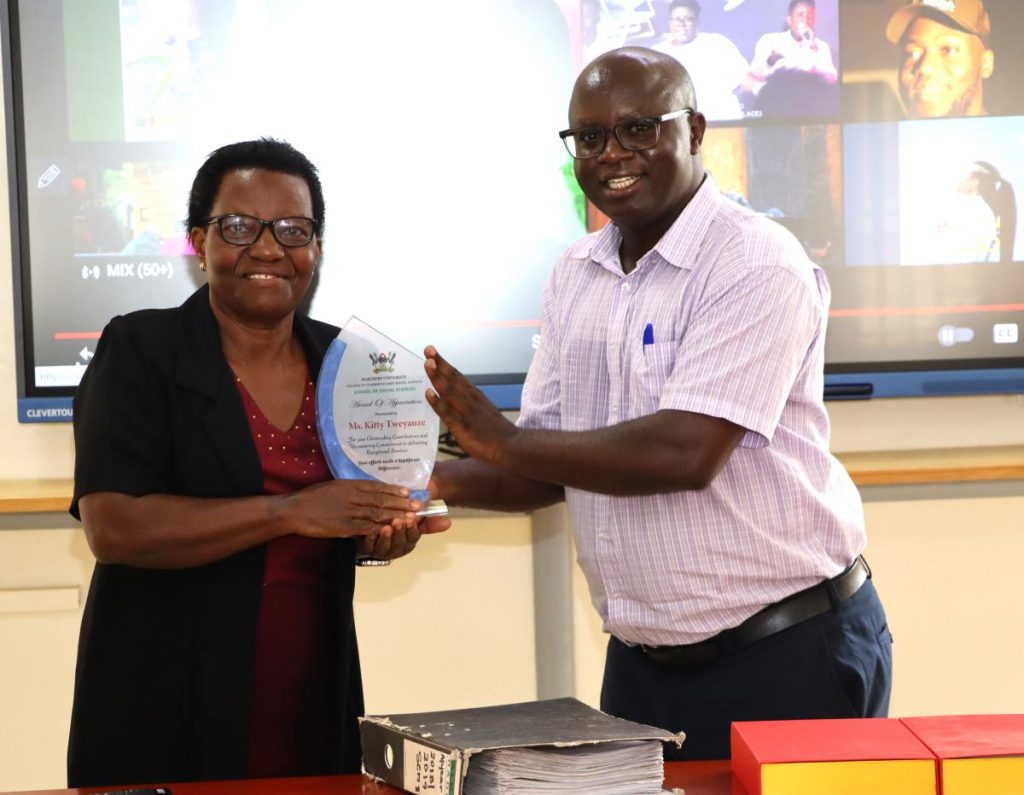
Kitty, who handled student results in the Dean’s office, emphasized the harmonious working relationships she had maintained throughout her tenure. “Since I joined Social Sciences many years ago, I have not found any problem with staff or students,” she said. “Staff have not had any issues with me, and students have been like colleagues to me. I am so grateful for everyone—the ones I found here and others who joined later.”
She expressed pride in the fact that she had never conflicted with or harmed anyone during her time at the university. “The work starts with me, with raw data, and I have worked closely with registrars and deans. We had to learn from one another, working on semester marks. The system then was not as advanced as today’s, and we would cross-check every complaint. All this made me work closely with deans, registrars, and heads of departments.”
Kitty also appreciated the Dean of the School of Social Sciences, Dr. Justus Twesigye, for recognizing their contributions, describing the recognition as a rare and valuable opportunity. “This could be the beginning of a new culture within the school,” she noted.
As she steps into retirement, Kitty expressed her willingness to continue supporting the school whenever needed. She encouraged colleagues to visit her at her home in Kyebando, a suburb of Kampala, assuring them that her door would always be open.
“I Am Going to Teach the Word of God,” Says Jackson Byamugisha
Jackson Byamugisha, who joined Makerere University in 2001 as a security guard, has officially retired from his position at the School of Social Sciences, where he served faithfully for many years. During the farewell ceremony Byamugisha shared his plans for the future, expressing his gratitude and faith.
“I am not here to hand over anything because I have nothing to hand over. I have just come to say farewell to all of you,” Byamugisha said, addressing his colleagues and friends at the school. “But one beautiful thing is that I am proud of having met all of you, and we shall still meet here and there.”
Byamugisha recounted a significant personal transformation he experienced during his time at the School of Social Sciences. “While I was here, I became saved,” he shared, prompting the audience to break into a joyful rendition of the popular Luganda praise song, “Tukutendereeza Yesu.”
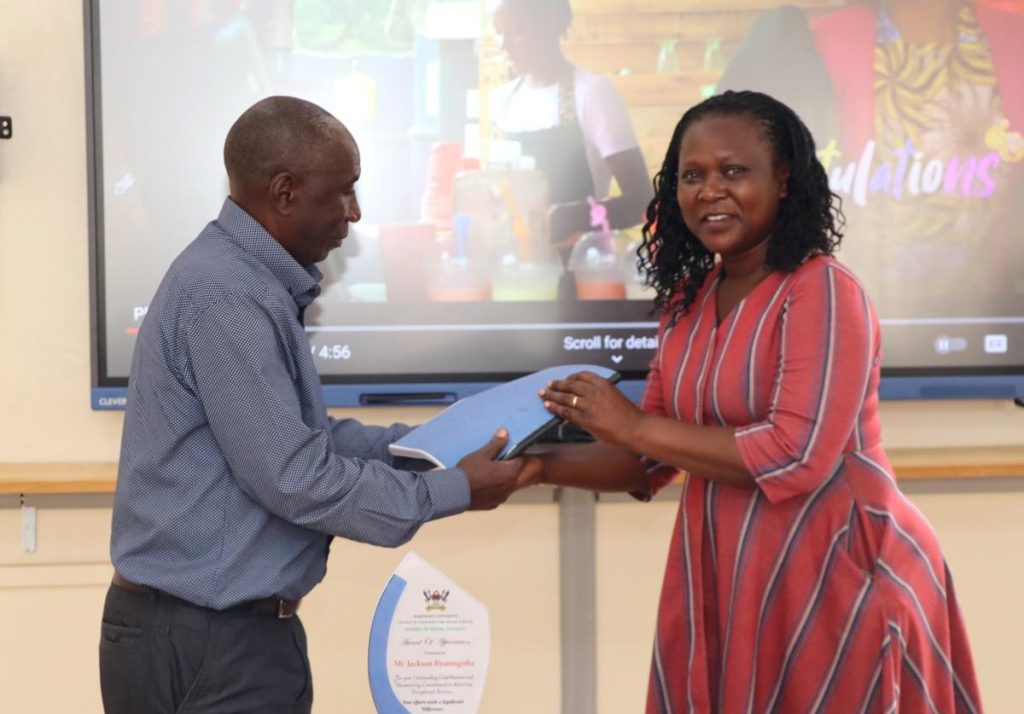
Reflecting on his time at the university, Byamugisha revealed that he discovered what he believes to be his true calling. “While here, I asked God to reveal my calling, and He told me I am an apostle,” Byamugisha said. “When I left Makerere two months ago, I asked God what I should do next. He told me to start teaching the Word of God.”
As a qualified adult educator, Byamugisha acknowledged that his new path in ministry might require additional qualifications. He appealed to his former colleagues for support as he embarks on this new journey. “This ministry work I am going into may require other qualifications, so I ask you all to assist me where needed,” he said.
Byamugisha’s announcement was met with encouragement and well-wishes from those present, who appreciated his dedication both to the university and to his newfound spiritual mission.
Retirees Among the Few to Witness Both Manual and Digital Systems – Dan Kiganda
The incoming School Registrar, Dan Kiganda, praised the retirees as invaluable resources who can continue to provide guidance and counseling even after their official retirement. Speaking at the farewell ceremony, Kiganda emphasized the unique experience and knowledge these retirees possess, having worked through both the manual and digital eras at Makerere University.
Kiganda described Ms. Kitty Tweyanze and Ms. Doreen Anek as “mothers” of the university’s administrative staff, noting that they played a crucial role in mentoring younger colleagues. “When I started working in the Academic Registrar’s office in 2010, Anek was one of the senior staff members guiding us in curriculum management,” Kiganda recalled. “Her level of wisdom and experience is something the school can still borrow from.”
He highlighted the significance of Anek and Tweyanze’s careers, pointing out that they are among the few who have had the opportunity to witness and work with both the university’s manual and digital systems. “Back then, when the university still had some funds, they would send non-teaching staff like Anek to South Africa to train on systems management,” Kiganda explained. “She has seen it all—from the manual systems to the current digital transformation.”
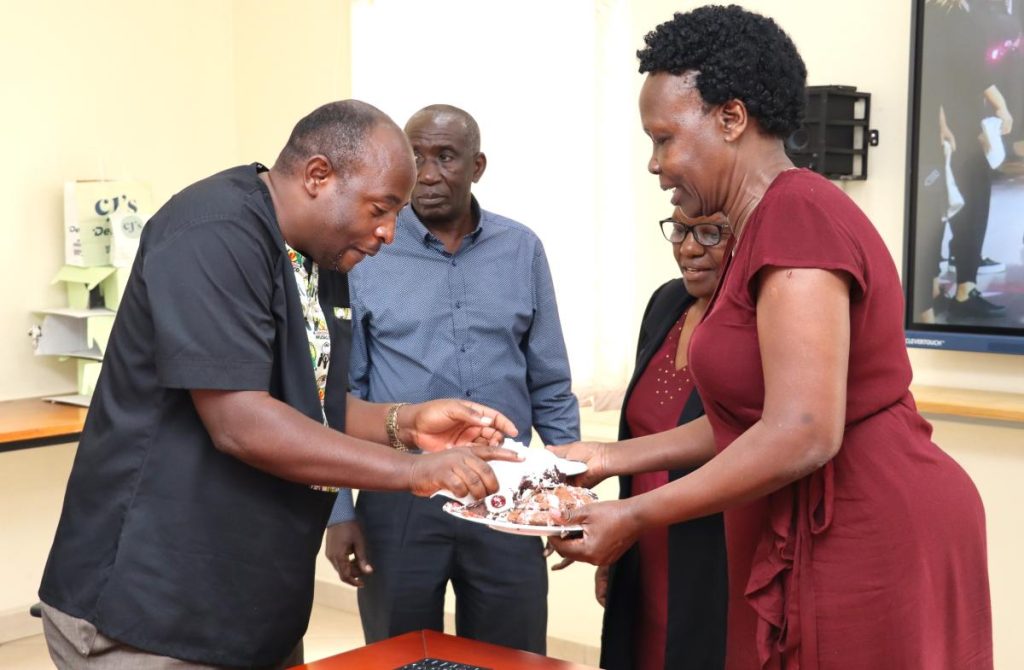
Kiganda expressed gratitude to both Anek and Tweyanze for their dedicated service, acknowledging the invaluable role they played in the Registrar’s department. “They are not so many who have had this dual experience. When I started in 2010, I was fortunate to have mentors like them, who could compare the manual and digital systems and help elevate the level of service we provide to this institution,” he said.
Kiganda concluded by thanking the retirees for their contributions and expressed confidence that their expertise would continue to benefit the university community even after their retirement.
You may like
-
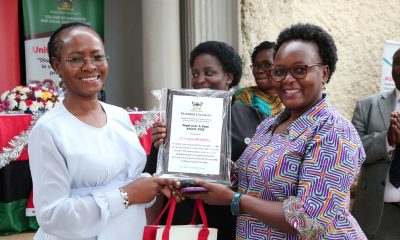

Dr. Pamela Khanakwa Honored for Steering Record 18 PhD Candidates for the Mak 2026 Graduation
-
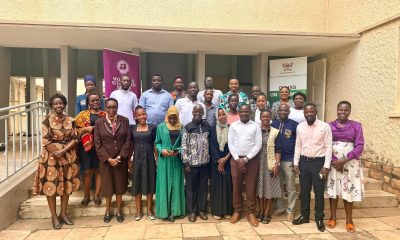

Ugandan Journalists Trained on Peace and Gender-Sensitive Reporting Ahead of 2026 Elections
-
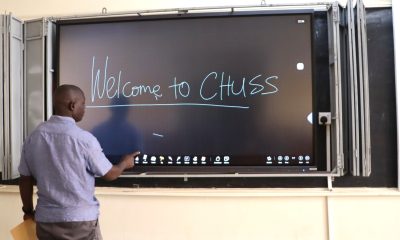

CHUSS Invests Over UGX 100 Million in Interactive Smart Screens, Upgrades Teaching Infrastructure
-
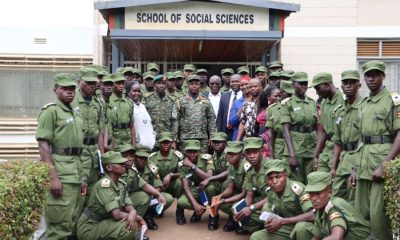

Over 130 Cadet Officers Oriented on Library Use at Makerere University
-
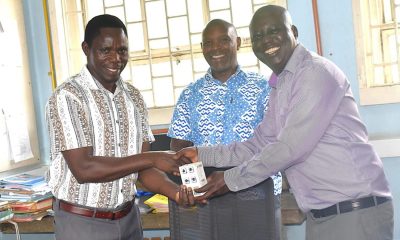

Dr Oruru Bosco Appointed Head of the Department of Physics
-


College of Humanities and Social Sciences Launches Five Groundbreaking Publications
Humanities & Social Sciences
Dr. Pamela Khanakwa Honored for Steering Record 18 PhD Candidates for the Mak 2026 Graduation
Published
3 weeks agoon
January 23, 2026By
Jane Anyango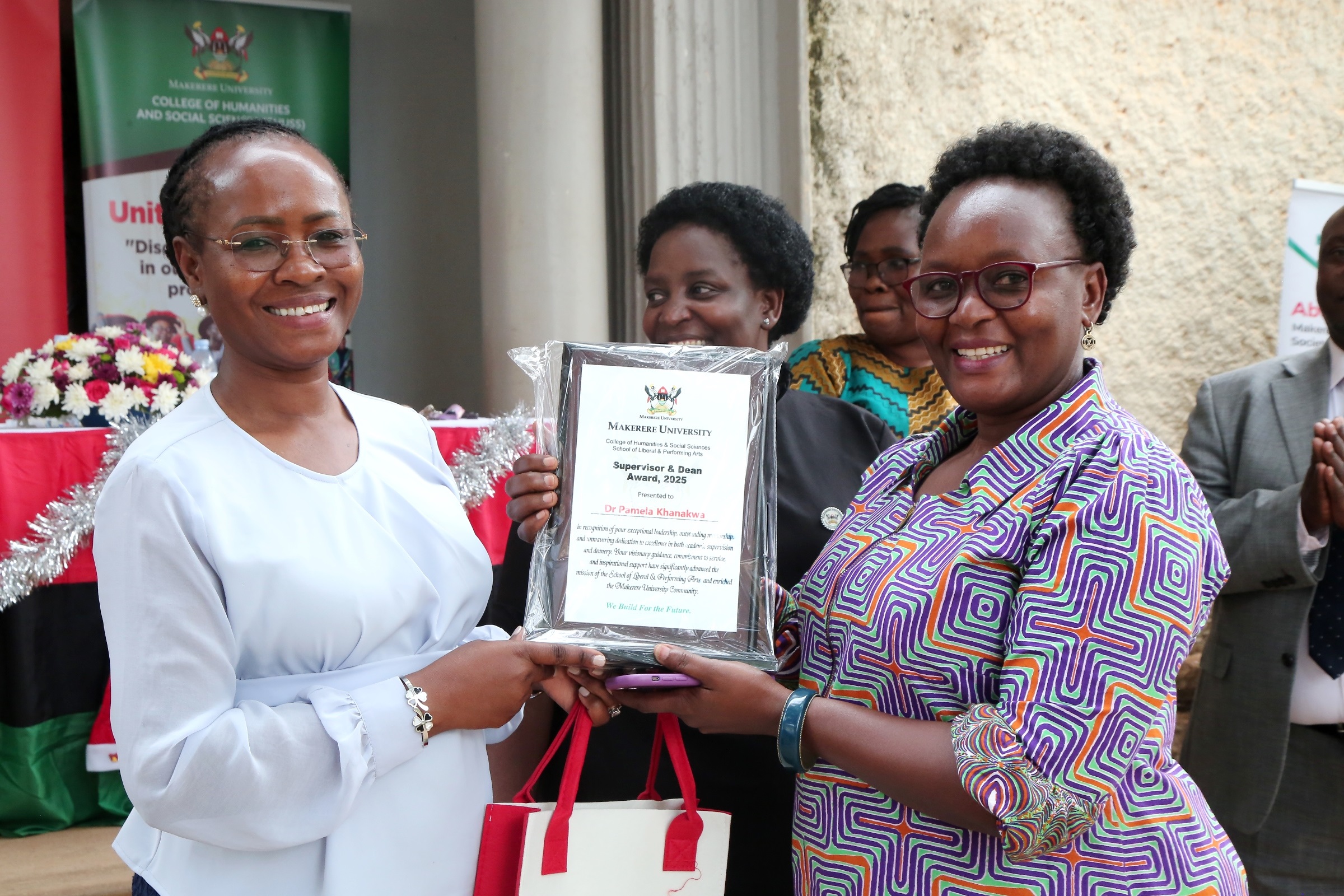
Six personally supervised, three completed in record time, as School of Liberal and Performing Arts sets a historic milestone. Dr. Pamela Khanakwa got the Award as Best PhD Supervisor and Dean
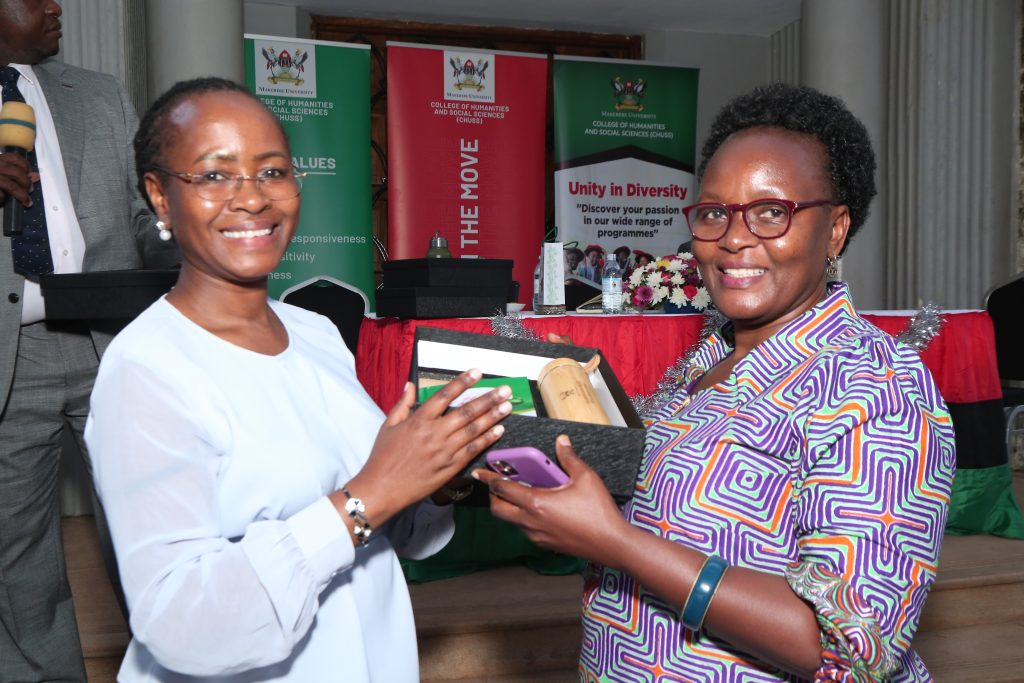
A Historic Academic Milestone for SLPA
The College of Humanities and Social Sciences (CHUSS) recognised the Dean of the School of Liberal and Performing Arts (SLPA), Dr. Pamela Khanakwa, for outstanding academic leadership that has seen the School field 18 PhD candidates for the next 2026 Makerere University Graduation Ceremony scheduled for 24th-27th February. Remarkably, six of these doctoral graduates were directly supervised by Dr. Khanakwa, with three completing within the official three-year timeframe, an exceptional achievement in graduate training. The recognition was announced during the CHUSS End-of-Year Get-Together, where staff applauded Dr. Khanakwa’s dedication, humility, and relentless commitment to postgraduate supervision and timely completion.
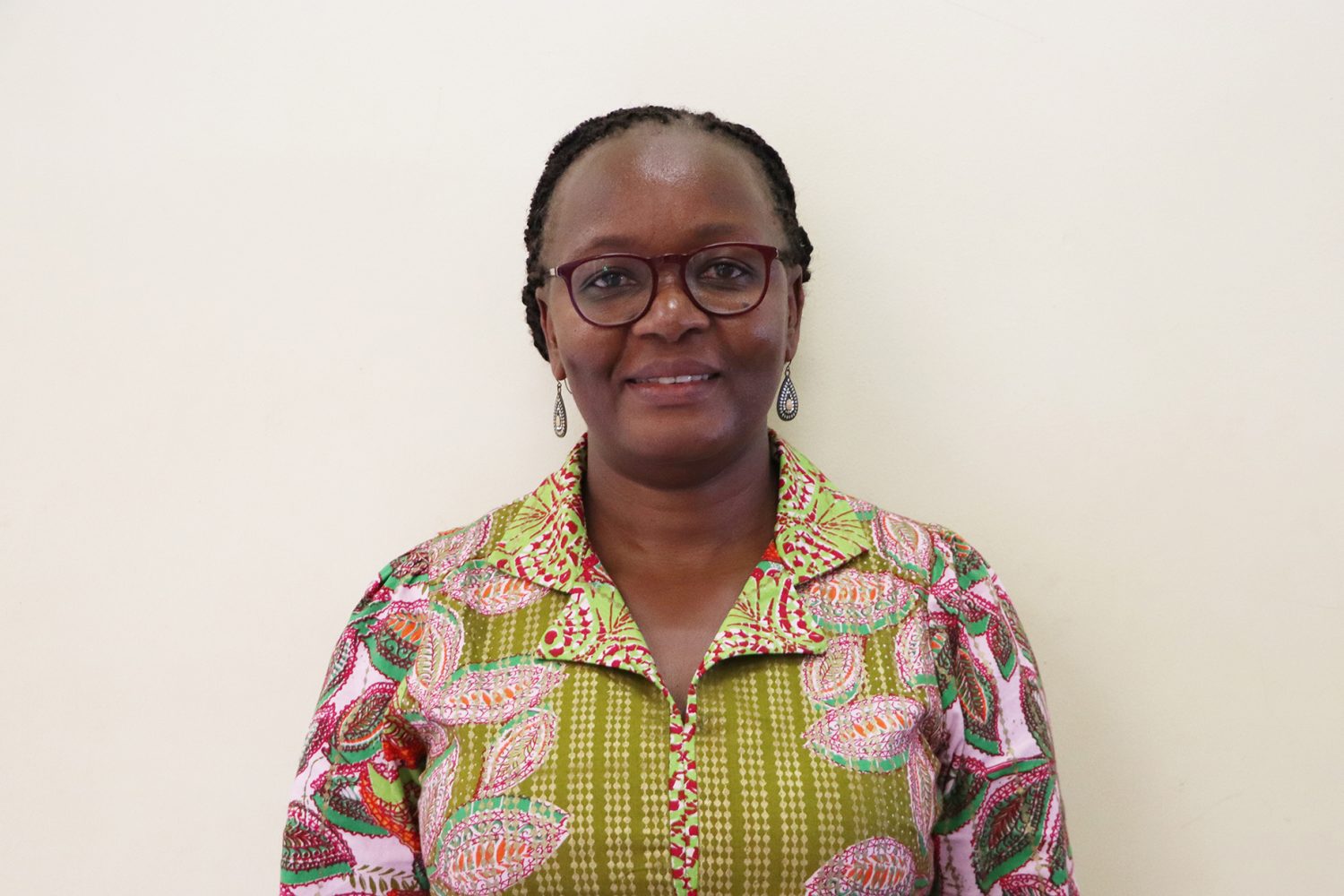
Message to Academic Staff
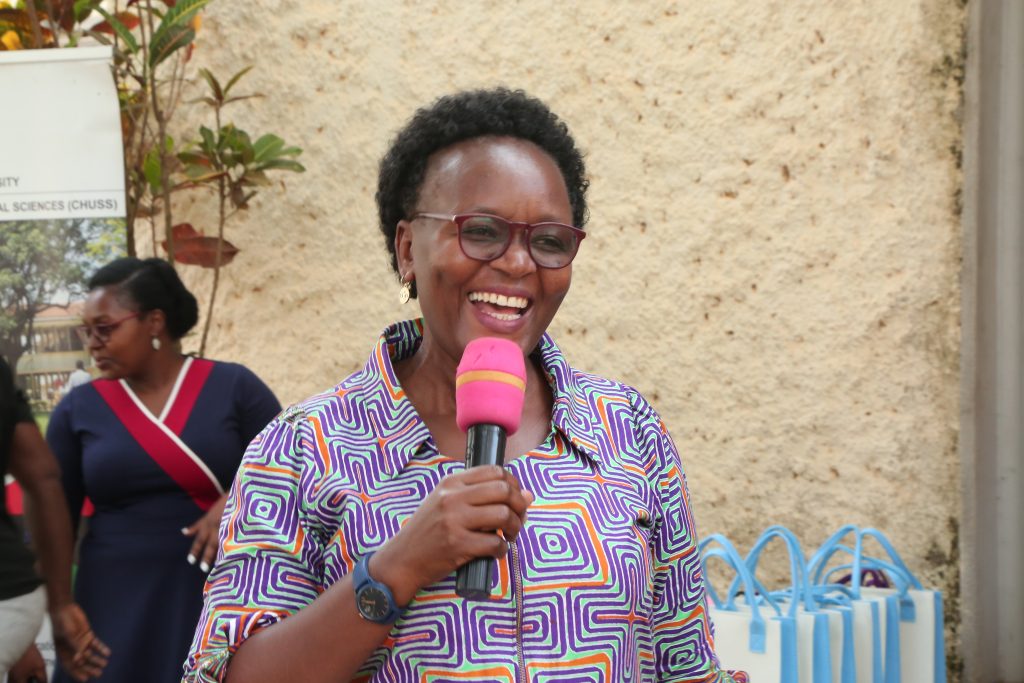
Q: What message do you have for your staff following this achievement?
Dr. Khanakwa:
First, I celebrate my staff and thank them for their dedication to supervision and student support. Academic work is demanding, and material rewards are often limited, but the true satisfaction comes from seeing students succeed.
I encourage my colleagues to remain committed. Yes, the workload is heavy, but many things are possible with dedication and teamwork. Let us continue working for the good of our students, our School, and Makerere University.
Leadership Rooted in Humility
Q: Many colleagues describe you as humble, down to earth, and hardworking. What shapes this character?
Dr. Khanakwa:
I think it is largely my upbringing. My mother was a primary school teacher from the 1950s until the mid-1980s. She worked extremely hard to raise us, combining teaching with farming to ensure we had school fees and basic needs. From her, I learned humility, discipline, and the value of hard work.
I also learned that leadership positions are temporary. You occupy them today, and tomorrow you move on. So humility is essential.
My graduate training also shaped me significantly. My PhD supervisor emphasized that graduate study is a full-time job and that results matter more than noise. Let people see your work through outcomes, not announcements.
Supervision as a Two-Way Commitment
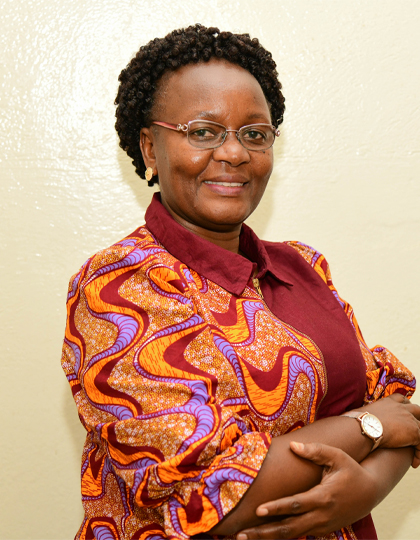
Q: How would you describe your supervision style?
Dr. Khanakwa:
I read my students’ work thoroughly, word by word. Sometimes my comments are tough, but they are honest. Supervision is a two-way commitment. I give feedback, but students must also respond and remain engaged. When that relationship works, progress happens.
Balancing Leadership, Scholarship, and Family
Q: How do you balance being a Dean, scholar, wife, mother, and daughter?
Dr. Khanakwa:
Honestly, I am not sure I balance perfectly. My mother lives far away in Bukwo, so visiting requires careful planning. My children grew up understanding the demands of academic life. I pursued my PhD in the United States and spent long periods away, but we adapted as a family.
Work has become part of my lifestyle. I use weekends to read dissertations, review manuscripts, and write. Sometimes my children ask if I ever sit without working, but this is the commitment I made. As we often say jokingly, “We humbly applied for the job, so let us do the job.”
Scholarship Beyond Supervision
Dr. Khanakwa is also an active scholar and editor. In the past year alone, she has:
- Edited scholarly volumes on archives, memory, method, and pedagogy
- Published a book with Routledge Companion
- Co-authored journal articles and book chapters with graduating students, including Priscah Asiimwe and Anatoli Lwasa Mpijja
“I feel an obligation to write with students,” she notes. “It takes time, energy, and commitment, but it is part of academic mentorship.”
Who Is Dr. Pamela Khanakwa?
Dr. Pamela Khanakwa is the Dean, School of Liberal and Performing Arts, College of Humanities and Social Sciences, Makerere University. She is a seasoned scholar, supervisor, administrator, and mentor whose leadership continues to redefine graduate training excellence. Details about Dr. Pamela Khanakwa can be accessed at: https://chuss.mak.ac.ug/en/personnel/pamela-khanakwa/
More details are available in her attached curriculum vitae.
The CHUSS End- Of-Year-Get-Together
On 12th December, 2025 the college leadership organised a get-together end of year gathering to take stock of the achievements, challenges and brainstorm together on how to move forward. The event was marked by entertainment, team building games, appreciation speeches, sharing a meal and a Christmas package for every staff
Retirees and staff recognised
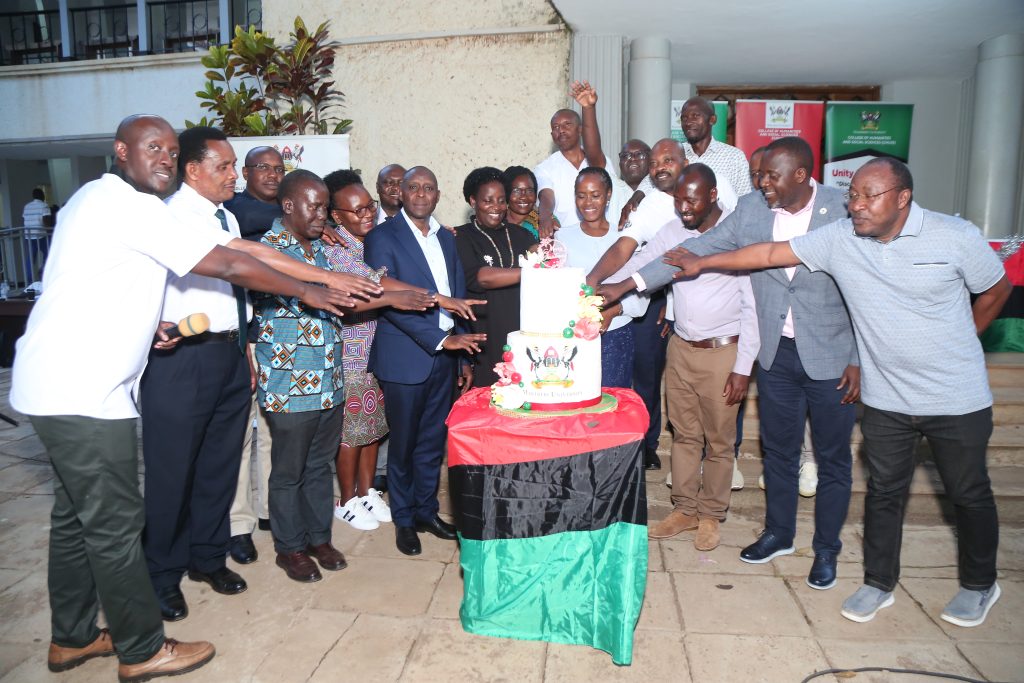
Five retired staff Dr. Micheal Wangotta Masakala, Dr. Anatole Kirigwajjo and Dr. Jackson Kizza Mukas (all from the School of Languages, Literature and Communication), Assoc. Prof. Florence Nansubuga (School of Psychology), Dr. Tusabe Gervase (School of Liberal and Perforing Arts) and Ms. Scovia Nganda Sekweyama (secretary from the School of Social Sciences) were recognised for their dedicated services to the university.
In addition to Dr. Pamela Khanakwa’s Award as Best PhD Supervisor and Dean, Ms. Birabwa Florence scooped the award of Best Registrar of the year. Birabwa is the registrar for the School of Liberal and Performing Arts.
Administrative and support staff including Ms. Mary Gyezaho and Annet Kashumbusha(both administrative secretaries in the Principals office), Farouq Lule (IT Officer), Godfrey Kakooza (cleaner), Charles Sebuguzi (driver) and Jane Anyango (Communications officer) were recognise with awards for outstanding service. Dr. Mohamed Mayanja Kajumba was from the School of Pyschology was recognised as the person with an outstanding talent in Handwriting.
The celebrations held in the Arts quadrangle were graced by the Vice Chancellor Academic Affairs Prof. Sarah Ssali and the Deputy Vice Chancellor in charge of Finance and Adminstration Prof. Ireeta Tumps.
Humanities & Social Sciences
Ugandan Journalists Trained on Peace and Gender-Sensitive Reporting Ahead of 2026 Elections
Published
1 month agoon
January 9, 2026By
Jane Anyango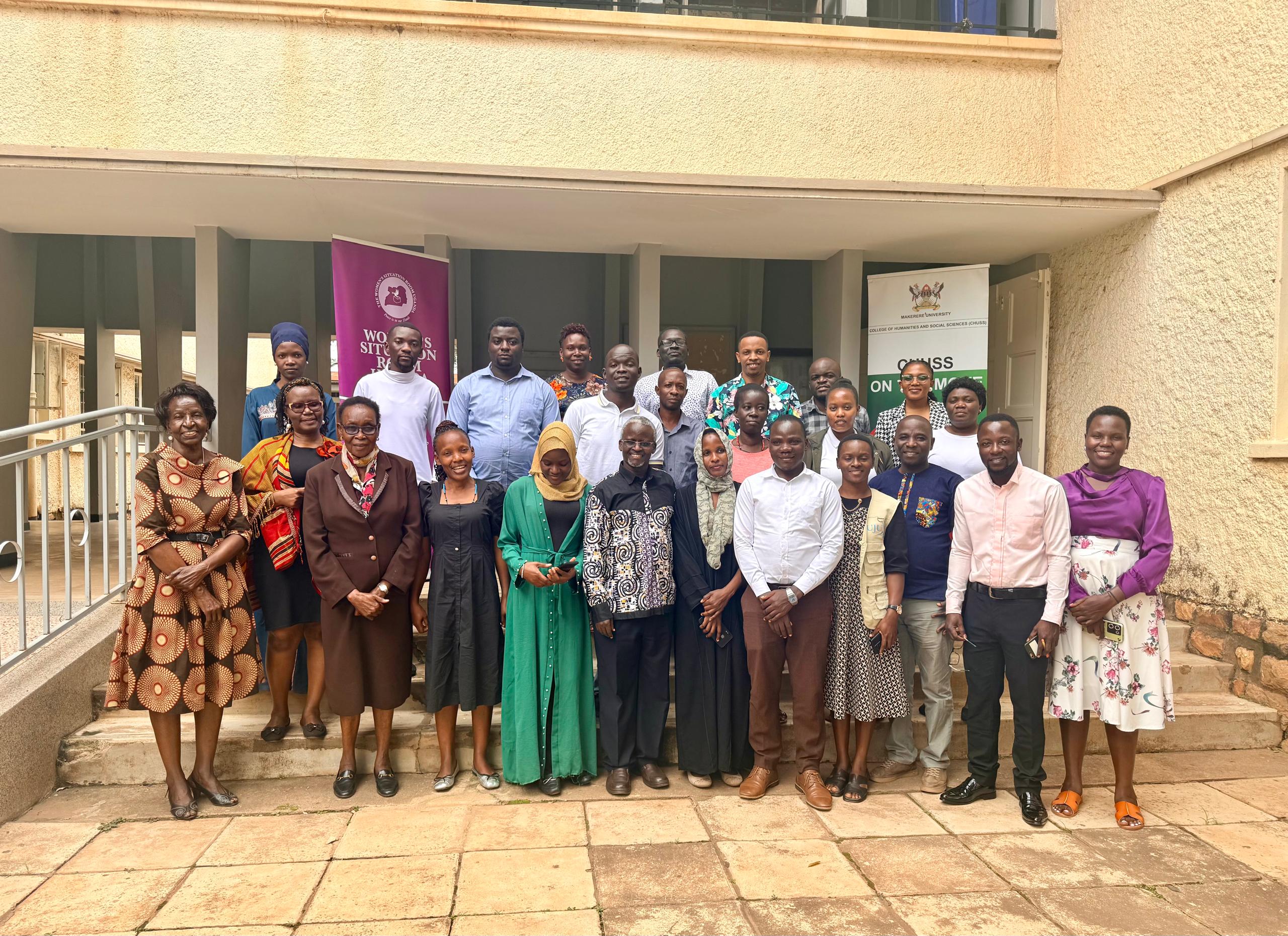
Kampala, Uganda – January 9, 2026
Ahead of the January 15 general elections, Ugandan journalists have undergone specialized training on peace and gender-sensitive reporting to ensure responsible media coverage during the election period. The two-day training, held from 8th to 9th January 2026 at Makerere University’s College of Humanities and Social Sciences Smart Room, was organized by the Women’s Situation Room (WSR) in partnership with various stakeholders and brought together journalists from across print, broadcast, and online platforms.
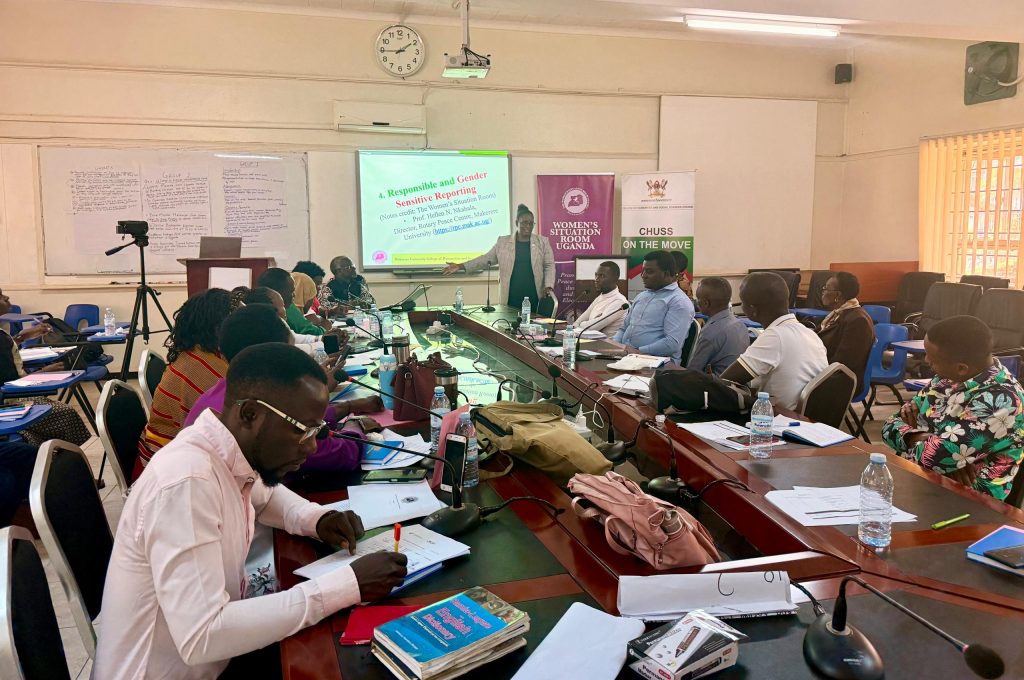
The main objective of the training was to strengthen the capacities of media in reporting and documenting electoral processes in a responsible and gender-sensitive manner. The specific objectives included: strengthening journalists’ skills to cover the 2026 elections in a fair, balanced, gender-sensitive, and non-violent partisan way; enhancing the role of media to enable citizens to be well-informed and actively participate in the election process; ensuring focused and balanced reporting on peace during and after elections; and strengthening partnerships between the WSR and media houses during the election period.
The training covered multiple critical modules. Day one focused on responsible conflict-sensitive reporting, emphasizing principles such as balance, impartiality, and accuracy. Participants explored the role of media as a relayer of the population’s voice, election monitor, catalyst for social cohesion and reconciliation, contributor to the accountability of political actors, and a platform for detecting and debunking digital media misinformation and hate speech.
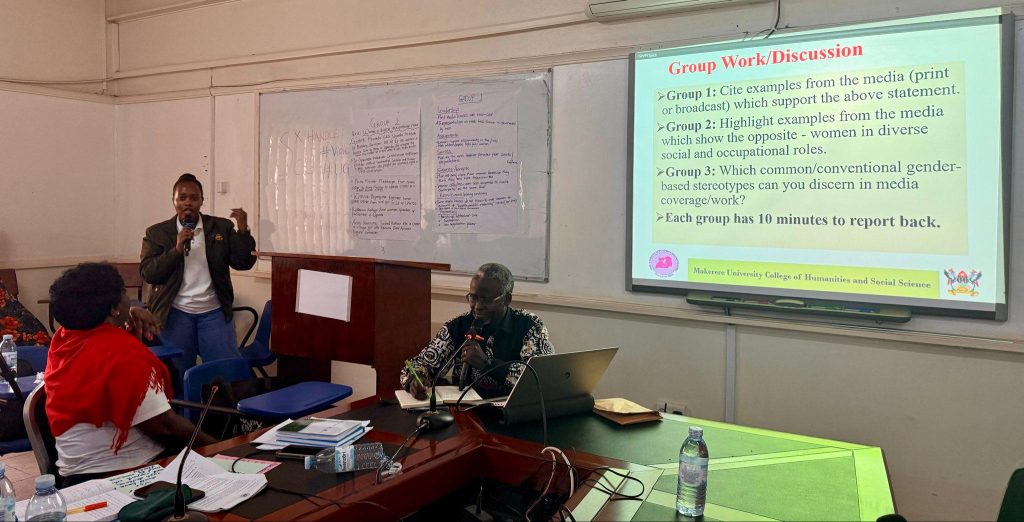
Day two addressed responsible and gender-sensitive reporting. Key aspects included the definition of gender-sensitive reporting, how to become a gender-sensitive reporter, critical elements in reporting with gender awareness, packaging gender-sensitive stories, and a checklist for detecting and avoiding gender-insensitive reporting.
Her Lordship, retired Judge Justice Mary Mayitum, emphasized the importance of peace as the foundation of development and democratic engagement. “Because we value peace more than anything. Without peace, really, you can do nothing. But where there is peace, you can have time to reflect, discuss with others, and join in meaningful dialogue,” she said. She warned that the country’s past conflicts, such as those in Gulu, underscored the necessity of maintaining national harmony.
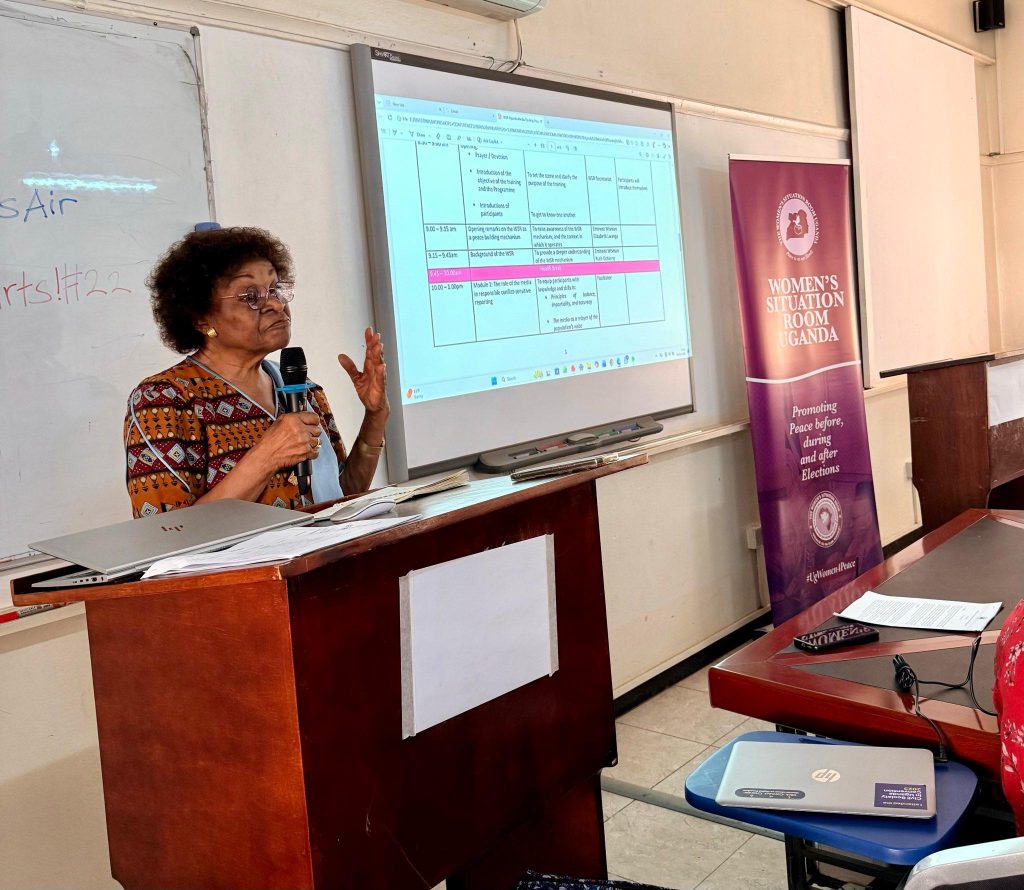
Justice Mayitum also urged other key election stakeholders to uphold peaceful conduct. “Being peaceful is the very heart of life. We have spoken to police, security personnel, political parties, and the Electoral Commission. We want politicians to have a code of conduct and to understand that it’s okay to think differently without fighting or hating one another,” she added.
Dr. William Tayebwa, lead facilitator and senior lecturer in the Department of Journalism and Communication at Makerere University, said, “This training is about conflict-sensitive reporting, peace journalism, and gender-sensitive reporting in the context of the elections. The emphasis was on giving female political candidates a voice while ensuring journalists report responsibly on election-related matters.”
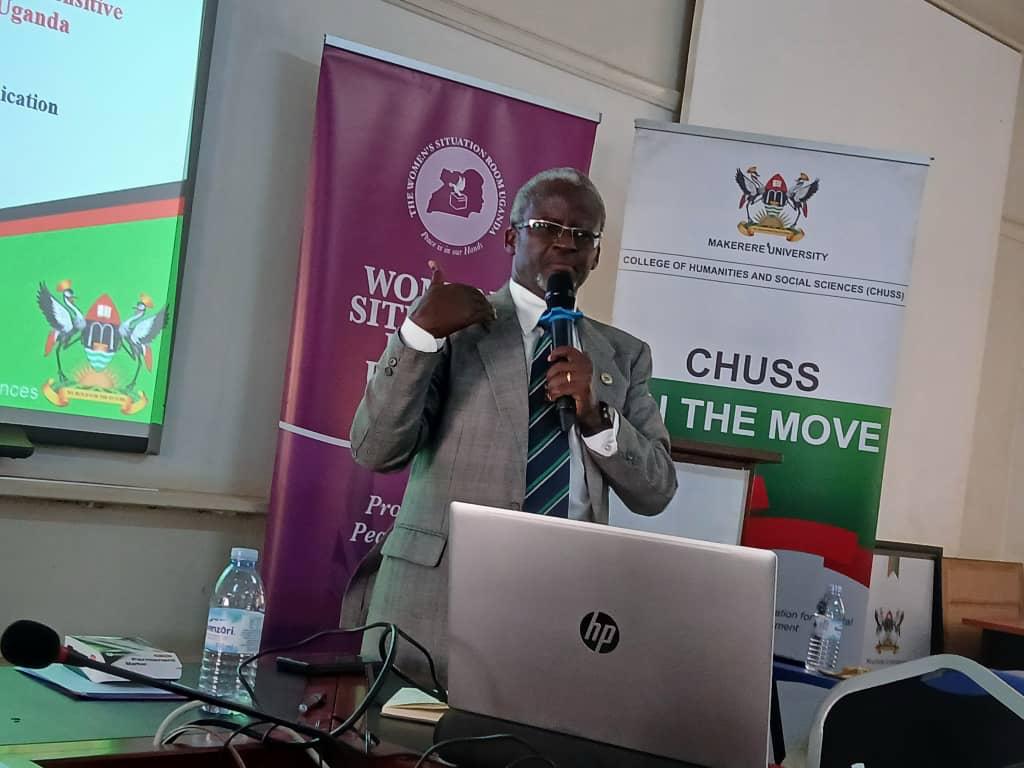
Participants described the training as timely and impactful. Tony Banizengabo of CBS Wakiso District said, “We’ve benefited a lot. We’ve been trained to write stories which bring peace, not conflict. Ahead of the elections, we are very ready to be part of peacemakers.”
Dorcas Kimono of UBC TV Kampala added, “It was so timely and rich. We learned how to report without promoting or fueling violence, giving voice to victims without angering them or encouraging violators. This is very vital, especially as we approach the 2026 elections.”
The training aims to equip media personnel with the knowledge and skills to uphold professional ethics while contributing to a peaceful, inclusive, and gender-sensitive electoral process.
Humanities & Social Sciences
CHUSS Invests Over UGX 100 Million in Interactive Smart Screens, Upgrades Teaching Infrastructure
Published
1 month agoon
January 9, 2026By
Jane Anyango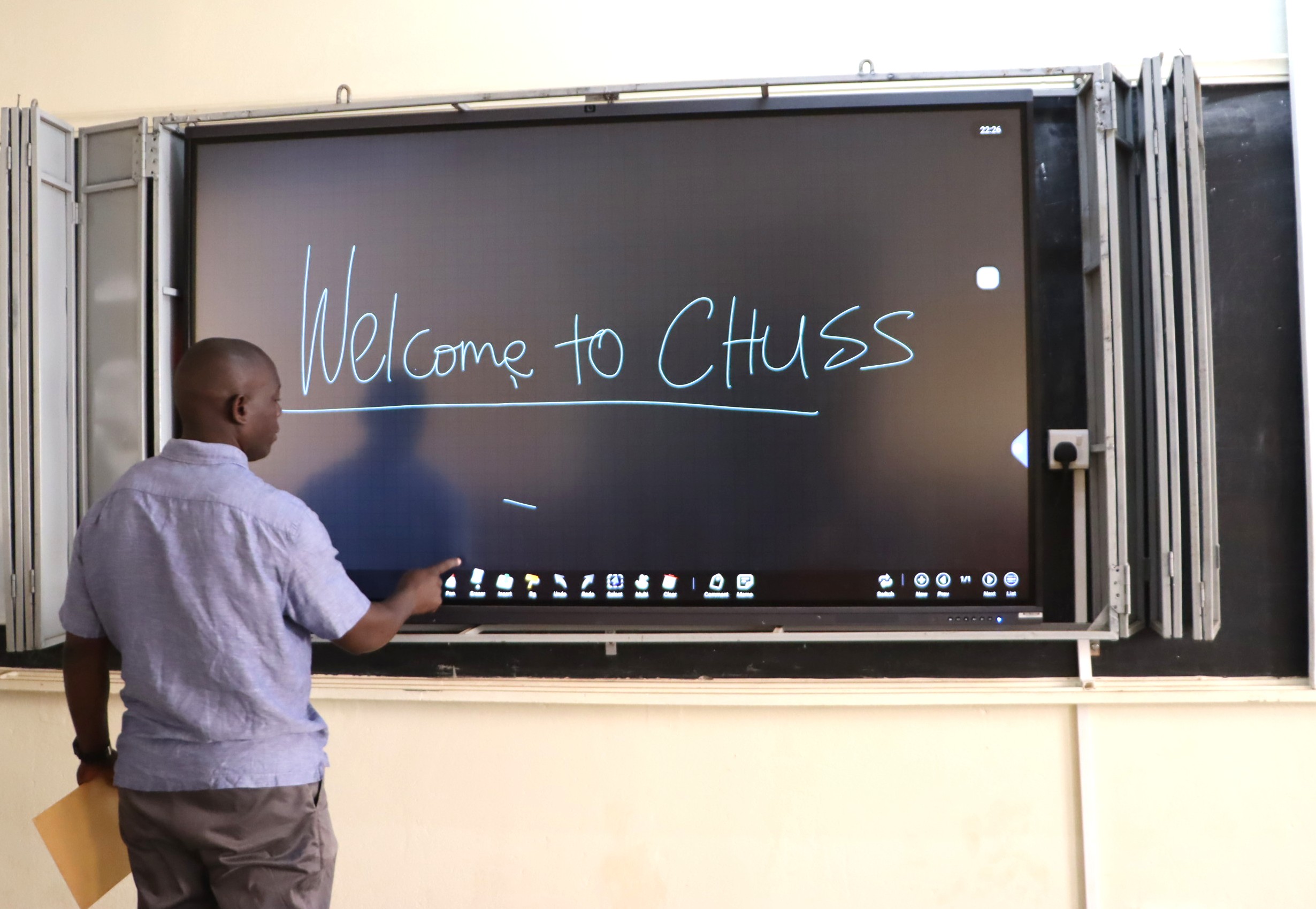
The College of Humanities and Social Sciences (CHUSS) has invested over UGX 100 million in the acquisition and installation of state-of-the-art interactive smart screens, marking a major step in strengthening digital teaching and learning at Makerere University.
Under the investment, 86-inch interactive 4K smart screens have been installed in major lecture rooms across the college’s schools, replacing traditional projectors and whiteboards. The upgrade is intended to modernise instructional delivery, enhance student engagement, and support blended and hybrid learning models.
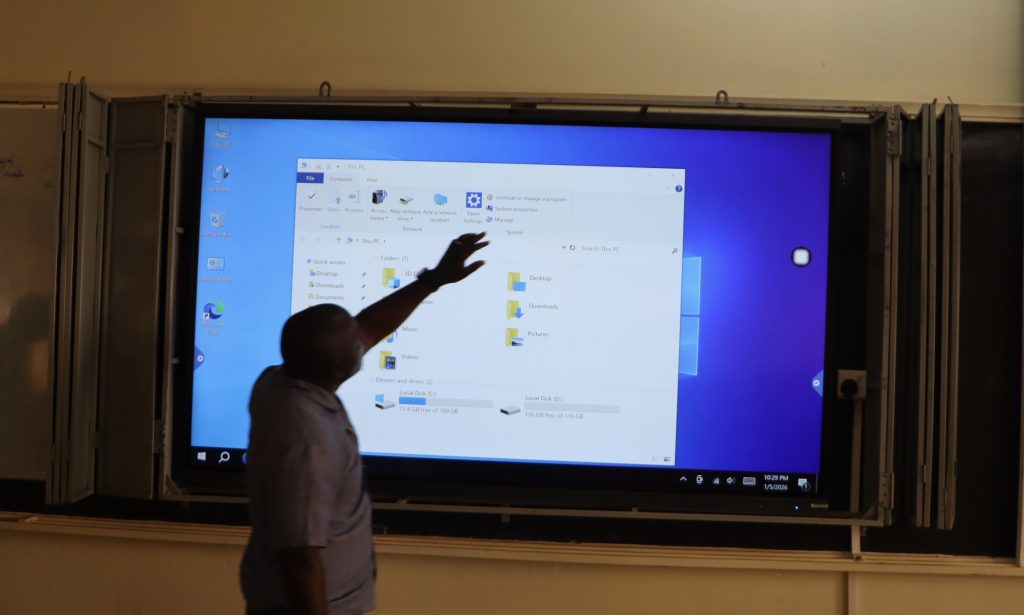
The touch-sensitive smart screens enable lecturers to write, draw, and annotate content directly on the display, while simultaneously integrating multimedia resources such as videos, presentations, and online materials. The screens support wireless screen casting from laptops, tablets, and smartphones, allowing for smooth, cable-free presentations and real-time sharing of students’ work during lectures and group discussions.
Designed to promote interactive and learner-centred pedagogy, the smart screens feature multi-touch capability that allows several users to interact with the board at the same time. This functionality supports collaborative learning, problem-solving exercises, and group presentations, making lessons more engaging and inclusive for students with diverse learning styles.
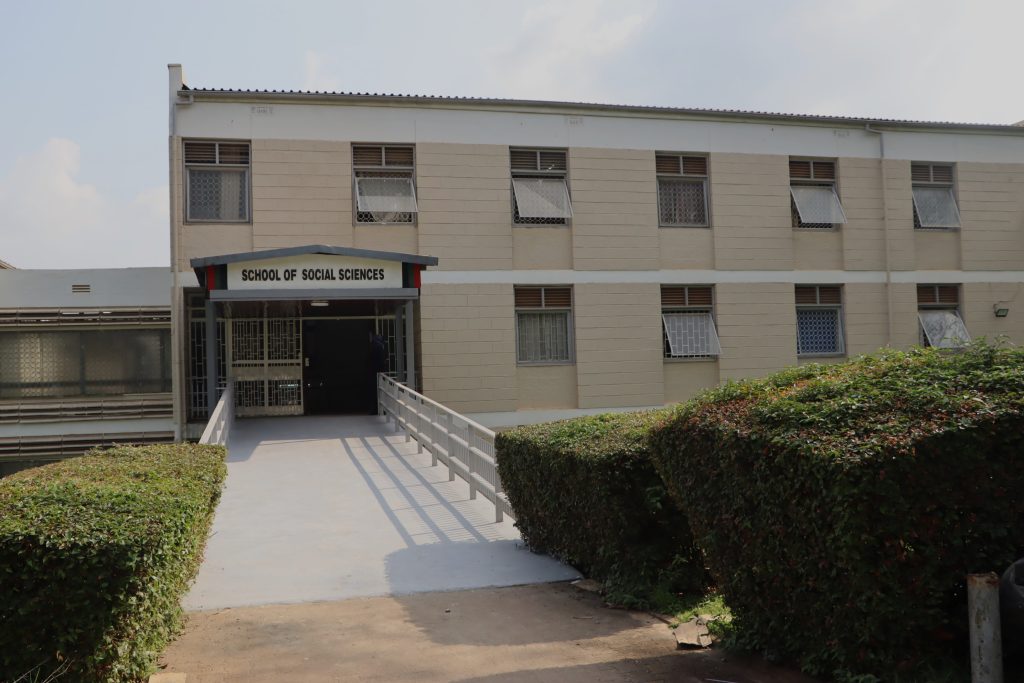
The boards are equipped with built-in cameras, microphones, and speakers, enabling seamless hybrid teaching through platforms such as Zoom, Microsoft Teams, and Google Meet. This allows lecturers to conduct virtual and physical classes simultaneously, record full lectures, and share them with students for later review, revision, or catch-up purposes.
Running on dual Android and Windows operating systems with full internet connectivity, the smart screens provide direct access to online academic resources, digital libraries, and learning management systems. Their AI-powered features further enhance lesson organisation, content clarity, and efficient, paper-free instruction, contributing to a more sustainable learning environment.
To ensure safety and prevent misuse, the smart screens are secured in fabricated metallic safety boxes installed in the lecture rooms.
Beyond digital infrastructure, CHUSS has also undertaken additional physical improvements. The Russian Lecture Room in the School of Languages, Literature and Communication has been furnished with new chairs, tables, and a projector screen, significantly enhancing its teaching environment.
The college has further improved staff working spaces, with the School of Psychology renovating office space and classrooms in Block A, while similar renovations have been carried out in the School of Social Sciences.
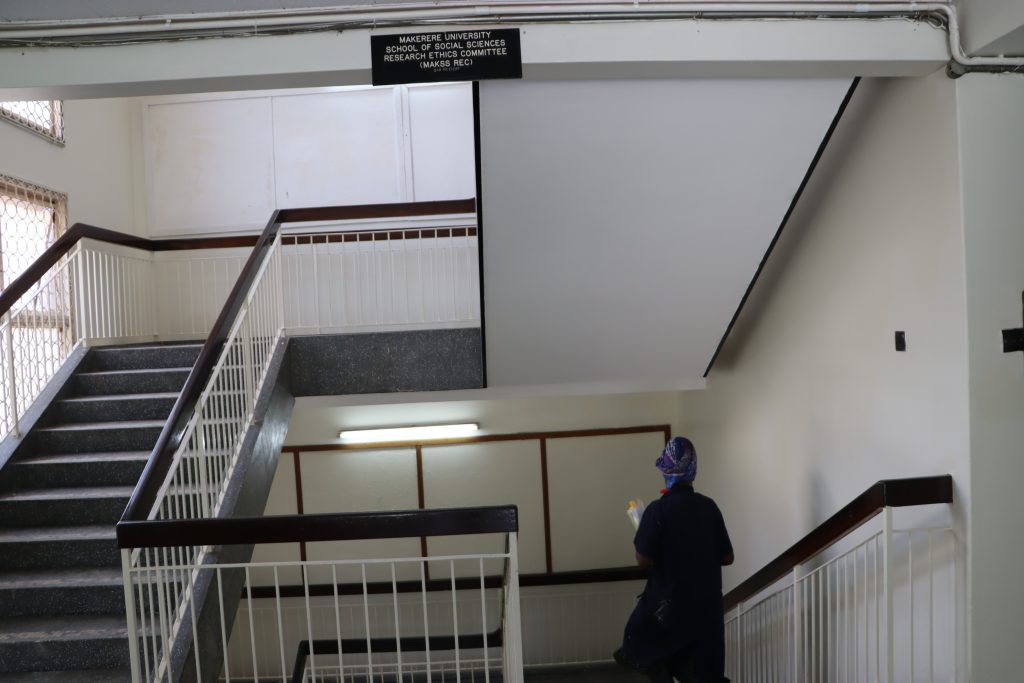
The infrastructural upgrades underscore CHUSS’ commitment to improving the quality of teaching, learning, and staff working conditions in line with Makerere University’s digital transformation agenda.
Trending
-

 General1 week ago
General1 week agoCall for Applications: Admission to Postgraduate Programmes 2026/2027
-

 Natural Sciences2 weeks ago
Natural Sciences2 weeks agoSimon Mungudit: Mak’s Best Performing Male Science Student & Rising Star in Petroleum Geoscience
-

 Agriculture & Environment1 week ago
Agriculture & Environment1 week agoFrom Adversity to Excellence: The Inspiring Journey of Makerere’s Best Science Student, Esther Ziribaggwa
-

 Health2 weeks ago
Health2 weeks agoCall For Applications: MakNCD Masters and PhD Training Opportunities
-

 Health2 weeks ago
Health2 weeks agoEU Earmarks Shs19.8bn for 15 Joint PhD Scholarships in Health, Environment Research
